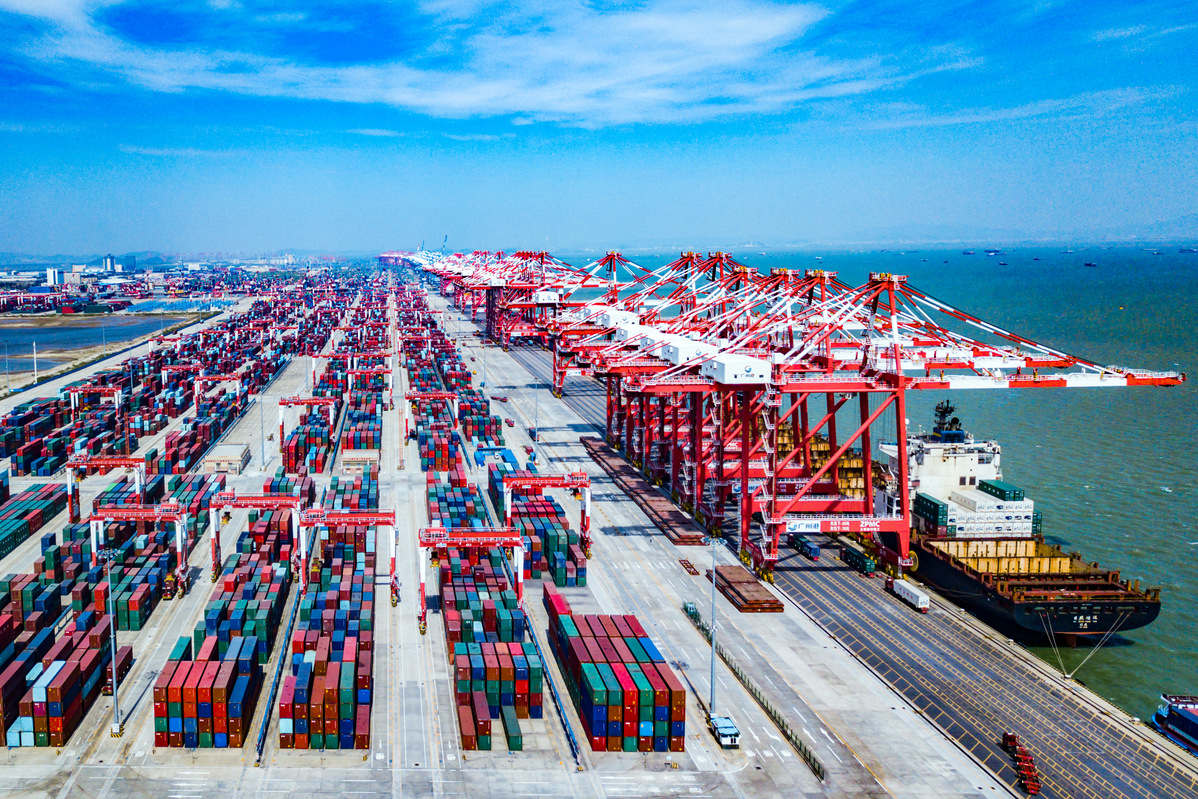Feb 04, 2025, 11:13

Photo shows a view of Nansha Port in Guangzhou, South China's Guangdong province. [Photo provided to chinadaily.com.cn]
Global Times-The multilateral trading system, embodied by the World Trade Organization (WTO), serves as the cornerstone of international trade activities, with the core mission of promoting the free flow of trade globally. WTO principles and disciplines constitute a core code of conduct for WTO members. The second Trump administration believes that fentanyl poses a severe threat to American society and wishes to have domestic challenges resolved by other countries who, under US pressure, would intensify their enforcement efforts. However, such unilateral trade coercion violates WTO rules and disciplines, thus constituting the incorrect way to solve the problem.
US unilateral tariff measures violate WTO rules
Firstly, they are in violation of the Most-Favored-Nation (MFN) treatment principle and tariff binding obligations. The principle of MFN treatment requires WTO members to treat like products from different members "equally" by granting preferential tariffs and other benefits to all other WTO members universally, unconditionally, immediately and without prejudice. However, the US additional tariffs on Canada, Mexico, and China are clearly discriminatory in nature. Substantial tariffs on products from specific countries and exclusion of Chinese products from the tariff levels for other WTO members clearly violate the MFN treatment. Bound duty rates listed by members in their schedules of concessions are a basic commitment to other members. Members may only reduce applied tariff rates voluntarily based on top of them and are strictly prohibited from increasing them arbitrarily. However, the tariffs additional on Canada, Mexico and China clearly exceed the bound tariff rates the US commits at the WTO. Such practices not only violate tariff binding obligations but also undermine the authority and effectiveness of WTO rules.
Secondly, they are difficult to be justified with WTO exception clauses. The US may seek to justify its unilateral tariffs by citing threats to public health or national security. But to invoke Article XX of the General Agreement on Tariffs and Trade (GATT 1994) on "General Exceptions" and Article XXI on "Security Exceptions," the US has to demonstrate not only the relevance and necessity of imposing tariffs to protect public health or national security, but also the absence of other less trade-distorting and equally effective means. However, factors such as the complexity of the fentanyl crisis and domestic market demand make it difficult for the exceptions to be applied.
Thirdly, the US should use the WTO's dispute settlement mechanism to address its concerns. If the US believes that other countries' trade measures are inappropriate and may violate WTO rules, it should seek solutions through the WTO's dispute settlement mechanism, rather than making its own judgments and taking unilateral actions. Instead, the US unilaterally imposes additional tariffs on Canada, Mexico and China without consulting the dispute settlement process. This undermines the stability and predictability of the multilateral trading system. As the US presses on in disregard of this process, other members can initiate WTO consultations, refer the matter to a panel, and, if necessary, take reciprocal "retaliatory" measures.
US unilateral tariff measures will have detrimental effects
The US unilateralist actions are prone to provoke detestation or even countermeasures from other WTO members. Retaliation in response to US tariffs on their products could lead to a global trade war. In the long run, the US actions will backfire. Higher tariffs will result in increased prices for imported goods, increasing burdens on American consumers and undercutting the competitiveness of US companies globally.
The key to solving the fentanyl issue lies in stronger multilateral cooperation
The US fentanyl crisis lies fundamentally in its immense domestic demand, which leads to abuse, and regulatory loopholes. Demand on the consumption side ramps up illicit production, and just like other synthetic drugs, fentanyl-related substances are produced with easily accessible chemicals that have other legal uses and with alternative synthetic routes. The crisis won't be fixed without fundamental elimination of the demand for the drug. Unilateral tariffs against other WTO members do not touch upon the root cause, let alone solving it once and for all.
After all, addressing the fentanyl issue requires cooperation, not unilateral trade coercion. The US should strengthen cooperation with relevant countries, improve oversight for chemicals, and crack down on trafficking networks. Only with intensified collaboration against drug trafficking and other illegal activities can there be lasting, sustainable progress.
The author is a professor at School of Law, University of International Business and Economics.
Community login






Add a comment